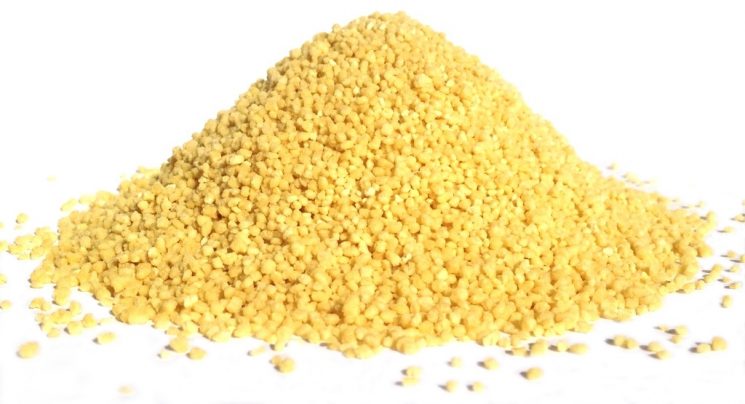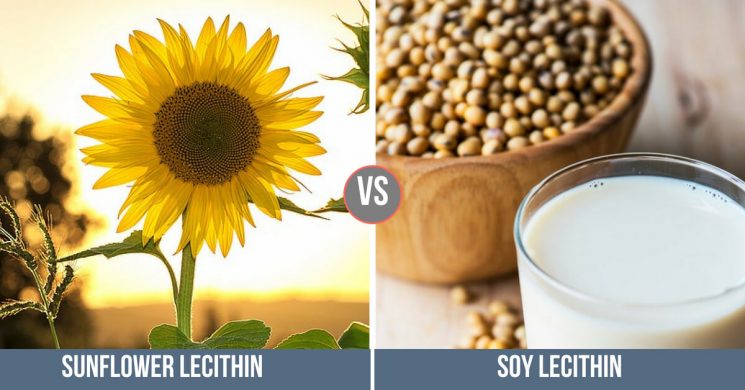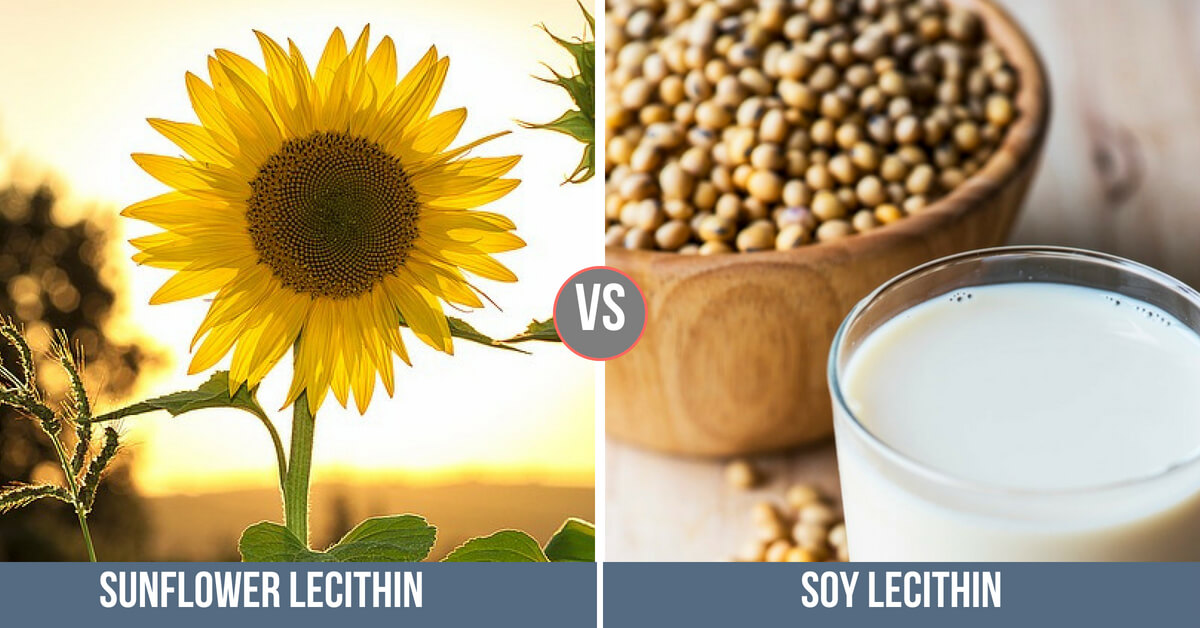Whether you’ve heard about it from fellow health fanatics, read about it online, or even seen it on a nutrition label, lecithin is a well-known component of a huge assortment of food products. While lecithin can be extracted from multiple sources, including eggs, canola, animal fat, and cottonseed, sunflower and soy lecithin are the two most popular varieties.
With controversy swirling around soy and its potential negative effects on the body, more and more people are seeking alternatives to soy lecithin, both as an ingredient in food products and as a supplement. But, what’s the real difference between sunflower and soy lecithin? When you dig deep, you’ll find that both of these lecithin types present unique benefits. But, it’s crucial to compare the two to make sure that you select the appropriate option for your health and lifestyle. Check out our recommendation on the best lecithin supplement.
Without further ado, let’s dive into the details of lecithin, its proven health benefits, and the key factors that differentiate sunflower and soy lecithin.

What’s Lecithin, Anyway?
Lecithin as an Additive
Lecithin is an additive found in all different types of food products, as well as some medications and cosmetics. It can come from any number of sources, with sunflower and soy being two main ones.
As with virtually any type of additive, lecithin from various sources are met with criticism in the world of nutrition. It’s all too easy to believe everything you read about food on the Internet, (we’ve all been there), which makes it all the more important to check for evidence backing a food-related claim before you go make a change to your diet.
Lecithin is included in food products because it lengthens shelf life, allowing food manufacturers to keep products on the shelf longer. The longer a food product can go without expiring, the less money manufacturers lose on unsold and expired goods. This fact is practical and understandable, but doesn’t make processed food any more appealing to us health-conscious individuals.
Phosphatidylcholine in Lecithin
Lecithin includes phosphatidylcholine, also referred to as PC. In fact, products that contain lecithin are considered to be ideal sources of PC. PC is a phospholipid, which has glycerol, fatty acids, and phosphorous.
Insufficient phosphatidylcholine in the body can lead to health complications including muscle damage, problems with organ function, and even non-alcoholic fatty liver disease. So, it’s crucial to maintain optimum PC levels in the body, and consuming lecithin can be a big help.

Lecithin also has several reported health benefits, including:
- Improved brain function
Longstanding studies show that lecithin has the ability to raise acetylcholine, an important neurotransmitter, in the brain. Acetylcholine is integral in both learning and memory in the brain. More specifically, acetylcholine contributes to the brain’s ability to encode new memories.
Evidence of lecithin as a memory-boosting supplement has been so promising, in fact, that proposals have been made to use lecithin as a treatment for degenerative cognitive diseases including dementia and Alzheimer’s disease.
- Improved liver function
Lecithin is praised for its ability to boost liver repair, namely individuals suffering from health complications due to a high-fat diet.
- Improved immune function
The antioxidant properties of lecithin suggest that it has the ability to boost your immune system. Sickness and inflammation can slow you down, but lecithin may be a smart addition to your diet to lower your risk of illness.
- Aids in healthy digestion
Lecithin has been shown to benefit people with ulcerative colitis. This is mainly due to lecithin’s emulsifying effect, which helps to coat intestines with mucus and, resultantly, reduce the risk for damage of the gastrointestinal lining.
In this same vein, lecithin is commonly prescribed in conjunction with certain medications to prevent gastrointestinal side effects. Lecithin supplements may also be used in the treatment of digestive disorders, though research to prove its benefits for conditions other than ulcerative colitis is sparse.
- May help treat high cholesterol
Lecithin is used in the treatment of high cholesterol because it raises the solubility of biliary cholesterol, a form of cholesterol that aids in fat absorption. This benefit is mainly attributed to soy lecithin, given other cholesterol-lowering effects of soybeans.
Lecithin is also a natural fatty compound that’s found in the cells of the body. It has many functions, namely managing the cell membrane and contributing to the synthesis of acetylcholine.
Soy Lecithin
If you go checking the labels of food products in the grocery store, you’ll realize that soy lecithin is an ingredient in more foods than you may have realized. From ice cream to bread, dietary supplements to margarine, soy lecithin is undeniably a common additive.
What before comparing soy lecithin to sunflower lecithin, let’s consider the soy lecithin’s unique advantages:
Why Opt for Soy Lecithin?
- Soy lecithin has been proven to have a positive effect on high cholesterol levels. Research has shown that soy lecithin can aid the body in lowering LDL cholesterol levels, which is the harmful form of cholesterol, and increasing HDL cholesterol levels, which is the beneficial cholesterol, in the blood.
- Soy has been shown to have a positive effect on satiety, or the feeling of fullness. When you eat a balanced, protein-rich meal or snack, it will leave you feeling satisfied. On the other hand, if you eat processed food that’s high in fat and sugar, (think of a doughnut, for example), you’ll find yourself with hunger pangs earlier than you’d like. Soy products take a comparatively long time for the digestive system to break down, so soy lecithin may help you stay full for longer and curb cravings throughout the day.
Sunflower Lecithin
Sunflower lecithin is derived from the sunflower plant. It contains four main phospholipids: phosphatidylcholine, phosphatidylethanolamine, choline, and phosphatidylinositol. These phospholipids contribute to the health benefits of sunflower lecithin, including improved brain function, better heart health, and a reduction in age-related bone or joint pain.
At the surface level, sunflower lecithin is often seen as a more natural and desirable form of lecithin than soy. Let’s consider the reasons for this below:
Why Opt for Sunflower Lecithin?
- A few key reasons why many people turn to sunflower lecithin over soy lecithin are because it’s vegan, non-GMO, and non-allergenic. Soy is a common allergen, and most soy products are made from genetically modified soybeans. In fact, 94% of soybeans grown in the United States were planted from genetically modified seeds.
- To extract sunflower lecithin from a sunflower plant, there’s no need for harsh chemicals, but the same can’t be said for soy lecithin. This is a significant benefit that leads many people to choose sunflower lecithin over soy lecithin. The extraction process is milder and results in a more natural product, which is especially desirable in today’s health-conscious world.
- Sunflower lecithin can be a viable alternative for people seeking the health benefits of lecithin, but who want to avoid hormonal complications that can come from eating soy products. Soy lecithin was found to be highly estrogenic in a study published in Food and Chemical Toxicology. Additionally, soy has been shown to cause thyroid problems in individuals who consume soy regularly over a long period of time.
- Sunflower lecithin has notes antioxidant effects, according to clinical trials from the Institute of Nutrition of RAMS. Including antioxidants in your diet curbs oxidative stress and the negative impact of free radicals, leading to improved overall wellness and longevity.
The Key Differences Between Sunflower and Soy Lecithin

Sunflower and soy are considered to be the two best sources of lecithin. This leads many people to wonder which one will most greatly benefit their overall health. If you’re seeking clarity as to which lecithin type will be the right one for you, read over these fundamental differences:
- Extraction Process
The extraction process to produce sunflower lecithin is milder than that of soy lecithin. To make sunflower lecithin, the sunflower plant is dehydrated and divided into three distinct components. These parts of the sunflower are the solids, the oil, and the gum. Sunflower lecithin comes from the gum and is extracted using a cold-pressed process. The cold press process is considered superior to other types of processes because it doesn’t require any added oxygen or heat. When nothing extra is added, none of the nutrients are lost – this means that the sunflower lecithin remains as pure and intact as possible.
The extraction process for soy lecithin is different. To extract the oil from the raw soybeans, a chemical solvent is used. Hexane, a chemical typically extracted from crude oil and petroleum, is the most common choice. It has an odor that smells similar to gasoline and is even used in many at-home stain removal products. The use of chemicals like hexane in the extraction of soy lecithin is enough to scare many people off, and with good reason. Opting for naturally processed, 100% chemical-free ingredients are the safest choice in a wholesome diet.
There’s usually only one type of soybean lecithin available in supplement form, and it’s as a granulated capsule. With sunflower lecithin, however, you have a couple of other options. Sunflower lecithin comes liquid and powder form, in addition to capsules. Liquid and powder sunflower lecithin may be mixed into shakes, smoothies, or juice, making them a great choice for people who have trouble swallowing pills. Powder sunflower lecithin can even be sprinkled over food – it won’t alter the taste of your food, so you’ll barely realize that you’re taking it.
- Hormonal Impact
As we already discussed in this article, soy is an estrogenic food and can impact hormone levels within the body. For this reason, people with thyroid disorders like hyperthyroidism, hyperthyroidism, thyroid nodules, and others are often advised to avoid soy products. People who are concerned about their risk for hormone issues from eating too much soy can choose sunflower lecithin instead, as it has none of the hormonal effects of soy.
- Allergen Risk
Soy lecithin is a soy product and will, therefore, trigger an allergic reaction in anyone with a soy allergy. Soy is one of the eight major food allergens in the United States and is recognized for its risk in causing severe allergic reactions. These eight major allergens are required to be labeled on any packaged food item in the U.S. If you or someone in your household has a soy allergy, sunflower lecithin will be your best bet if you’re seeking to incorporate lecithin into your diet.
- GMO Use
The majority of soybeans grown in the United States are from genetically modified seeds. As a result, soy lecithin is usually derived from soy with GMOs. Sunflower lecithin is a more natural option for those seeking to avoid GMOs in their diet. GMO farming often entails the use of pesticides and may pose a health risk due to the potential for new allergens in GMO products.
Conclusion
After covering the key dietary advantages that lecithin has to offer, along with the factors that set soy and sunflower lecithin apart, we can draw a clear conclusion as to which option will be right for you. It goes without saying that people with a soy allergy should take sunflower lecithin as an alternative, along with anyone with a thyroid condition. Additionally, people adopting a non-GMO diet will likely want to avoid soy lecithin, given that most American grown soybeans are grown with GMOs.
With all that said, soy lecithin is the more common form of lecithin found in commercial food products. These products are almost always less expensive than organic, non-processed options, which may be out of reach for some people. As with most foods, soy lecithin in moderate amounts won’t seriously harm your health, and you’ll still reap the benefits of all lecithin types, including healthy brain function, liver function, and digestion. Of course, when possible, opt for fresh, whole, and non-processed foods, and read nutrition labels to stay informed about the foods you eat. Just like soy and sunflower lecithin, you may be surprised to learn about the ingredients in all of your favorite foods!





That was a very detailed comparison of soy and sunflower lecithin differences. Soy lecithin sounds dangerous. The became product used to extract just scared me!